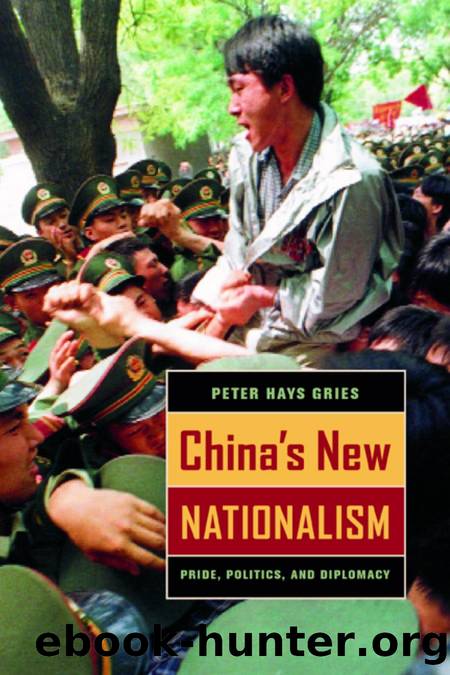China's New Nationalism: Pride, Politics, and Diplomacy by Peter Hays Gries

Author:Peter Hays Gries [Gries, Peter Hays]
Language: eng
Format: azw3, mobi
Tags: General, Asia, History
ISBN: 9780520931947
Publisher: University of California Press
Published: 2004-01-30T15:14:10.373912+00:00
c h a p t e r 7
Popular Nationalism
and the Fate
of the Nation
â1.2 billion Chinese
are outraged!â
Following the 1999 bombing of the Chinese embassy in Belgrade, Zhou Yi, a high school student from Wuhan, joined a demonstration. He later wrote:
I entered the group [of protestors] because I wanted to march with them, to shout out my outrage with them. . . . As a high school student among college students, I thought I would feel lonely, but I felt that I belonged. There were no divisions between male and female, old and young: we were all one family! . . . We were all Chinese boys and girls, sons and grandsons of the Yan and Huang Emperors. . . .
Because we are Chinese . . . we cannot be silent. . . . We must scream, we must proclaim our outrage to the world, and we must defend our compatriots, our sovereignty, and our self-respect.1
Did Zhou Yi act spontaneously, or was he just a plaything in the hands of Communist puppeteers? Chinese and Western observers of Chinese nationalism have long disagreed over who the agents of Chinese nation-116
P O P U L A R N A T I O N A L I S M A N D T H E F A T E O F T H E N A T I O N
117
alism are. Chinese pundits ascribe agency to the masses; Westerners point to the elites.
Twentieth-century Chinese commentators have tended to describe Chinese nationalism as a âmassâ or âpopularâ movement. At the turn of the last century, for example, many Chinese nationalists embraced Western Orientalist rhetoric about the Asian masses. After traveling to California and witnessing the lowly position of Chinese there, the renowned Japanologist Huang Zunxian returned to China and jubilantly exclaimed,
âNow the Whites are afraid of the âYellow Perilâ . . . It is we, we Asians!
We! We! We!â2 Nationalist pride could be found in the power of the Asian masses.
It was with the arrival of Marxism, however, that popular nationalism arguments in twentieth-century China became standard. Impersonal social forcesâthe working and peasant âmassesââbecame the agents of Chinese history. In the communist worldview, the masses were, by their very definition, an anti-imperialist social force. Chinese Communist Party founder Chen Duxiuâs evolving views of the Boxer Rebellion of 1900 shed light on this phenomenon. As a liberal enlightenment intellectual in 1918, Chen vilified the Boxers as superstitious and backwards; as a confirmed Marxist in 1924, he praised the Boxers as patriotic anti-imperialists.3 Although his view of the Boxers changed radically, Chen consistently depicted them as a bottom-up âmassâ phenomenon.
With âLiberationâ in 1949, the view of mass nationalism became even more predominant in mainland China, but it also evolved. PRC histories of the âCentury of Humiliationâ highlighted âspontaneousâ anti-imperialist uprisings: mass nationalism. However, while Communist ideology prescribed that the masses be given agency in leading the revolution, the dictates of nationalist politics demanded that such assertions be qualified by the ubiquitous âunder the leadership of the Party â (zai Dang de lingdao zhi xia).
Download
China's New Nationalism: Pride, Politics, and Diplomacy by Peter Hays Gries.mobi
This site does not store any files on its server. We only index and link to content provided by other sites. Please contact the content providers to delete copyright contents if any and email us, we'll remove relevant links or contents immediately.
| Anarchism | Communism & Socialism |
| Conservatism & Liberalism | Democracy |
| Fascism | Libertarianism |
| Nationalism | Radicalism |
| Utopian |
The Secret History by Donna Tartt(19053)
The Social Justice Warrior Handbook by Lisa De Pasquale(12187)
Thirteen Reasons Why by Jay Asher(8893)
This Is How You Lose Her by Junot Diaz(6877)
Weapons of Math Destruction by Cathy O'Neil(6265)
Zero to One by Peter Thiel(5787)
Beartown by Fredrik Backman(5737)
The Myth of the Strong Leader by Archie Brown(5500)
The Fire Next Time by James Baldwin(5431)
How Democracies Die by Steven Levitsky & Daniel Ziblatt(5215)
Promise Me, Dad by Joe Biden(5141)
Stone's Rules by Roger Stone(5081)
A Higher Loyalty: Truth, Lies, and Leadership by James Comey(4954)
100 Deadly Skills by Clint Emerson(4921)
Rise and Kill First by Ronen Bergman(4780)
Secrecy World by Jake Bernstein(4741)
The David Icke Guide to the Global Conspiracy (and how to end it) by David Icke(4709)
The Farm by Tom Rob Smith(4502)
The Doomsday Machine by Daniel Ellsberg(4484)
